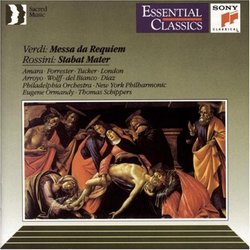| All Artists: Giuseppe Verdi, Gioachino Rossini, Eugene Ormandy, Thomas Schippers, Abraham Kaplan, Richard Tucker, Maureen Forrester, George London, Lucine Amara, Martina Arroyo, Tito Del Bianco, Justino Diaz, Beverly Wolff, Philharmonia Orchestra, New York Philharmonic Title: Verdi - Messa da Requiem / Ormandy · Rossini - Stabat Mater / Schippers Members Wishing: 0 Total Copies: 0 Label: Sony Original Release Date: 1/1/1993 Re-Release Date: 5/18/1993 Genre: Classical Styles: Opera & Classical Vocal, Historical Periods, Early Music Number of Discs: 2 SwapaCD Credits: 2 UPC: 074645325224 |
Search - Giuseppe Verdi, Gioachino Rossini, Eugene Ormandy :: Verdi - Messa da Requiem / Ormandy · Rossini - Stabat Mater / Schippers
 | Giuseppe Verdi, Gioachino Rossini, Eugene Ormandy Verdi - Messa da Requiem / Ormandy · Rossini - Stabat Mater / Schippers Genre: Classical
|
Larger Image |
CD Details |
CD ReviewsVital performance Michael K. Halloran | 11/27/1999 (5 out of 5 stars) "Every classical music lover has certain albums or discs that they have a particular fondness for, in spite of what the critical consensus may be. This recording of Verdi's Requiem is one of mine. In our current era of flawless ensemble and bloodless excellence above all, Ormandy leads a highly charged, individual performance of this masterpiece.The soloists (despite the dismissal in the Penguin Guide) are all excellent, with particular honors going to Richard Tucker and Lucine Amara, whose pianissimo B-flat in the "Libera me" is exquisite. She is one of those artists taken for granted during her time, but whose talent and commitment would be most welcome today.Ormandy has an (undeserved) reputation of being dependable but dull; however, on this recording he is anything but run-of-the-mill. Listen to the frenzy he whips up at the beginning of the "Dies Irae" (terrific sound, by the way -- listen to that bass drum!) or the beauty with which he shapes the "Recordare." This is a conductor who is in the service of the music, not the other way around. This is most refreshing, especially since so many uber-maestros tend to turn this work into a showcase for how idiosyncratic their style can be.The performance of Rossini's "Stabat Mater" which accompanies this set is more of a disappointment. I prefer the Chung recording on DG or the Hickox on Chandos. But no matter. At super-bargain price, this "Requiem" should not be passed by!" Jeepers! Wayne A. | Belfast, Northern Ireland | 05/07/2005 (5 out of 5 stars) "After listening to this sort of music for decades, NOW I discover Eugene Ormandy. When I was a kid he was marketed as the smooth, slick "Philadelphia Sound" guy. He was everywhere but no heavyweights ever seemed to take him seriously. You'd buy your Aunt Tillie an Ormandy LP for Christmas; you'd buy yourself von Karajan or Szell...you know, serious conductors. Man, were we wrong. Virtually everything I'm hearing from this guy, recorded from the 1930s to the 1960s is knockout. His Beethoven Fifth is stellar. After years of getting my brains pounded out on that warhorse by everyone from Toscanini to Kleiber (either one!) FINALLY I come across a Fifth that eschews the melodrama yet totally convinces. It's magnificent, flawlessly played, and perfectly judged. If ever the word Olympian could be applied to a performance this would be the one. Even when Ormandy does go over the top, as he can in this incredible Verdi Requiem, it's done in a well-conceived way. In poetry, the words and subtle emphasis should carry the weight of a poem, shouting isn't necessary. Shouting just makes an audience jump and over long periods makes them cranky. I realize now that a lot of conductors, less musical than Ormandy, kind of shouted their way through masterpieces. " One of the few Great Verdi Requiem Recordings! A. Craig | Grand Junction,CO | 02/03/2004 (5 out of 5 stars) "First of all I agree with the first reviewer when he says thatEugene Ormandy is undervalued as a conductor. This is one of thefew really great recordings of this massive work. The soloists are all legends of the opera and concert stages. The only quartetof singers that could give them any real competition would be Sutherland, Horne, Pavarotti, and Tavela, on the recording with Solti on Decca. I am happy that Sony decided to issue itboth on the Essential Classics label and on SACD. Praise shouldalso go out to the Westminister Choir for their important andwonderful contribution to this recording. It would be interestingto see if Sony would issue it on a single CD, since one it wouldfit and they have already issued it on a single SACD, but it isonly a single layer one not a hybrid. In my opinion many modernconductors could learn a lot from listening to Maestro Ormandy'srecordings especially this one!"
|

 Track Listings (13) - Disc #1
Track Listings (13) - Disc #1